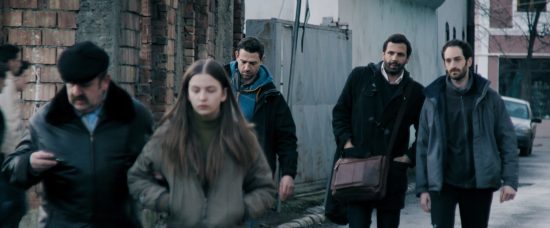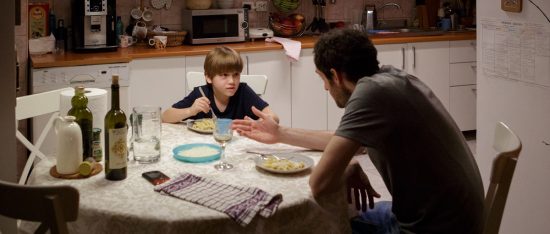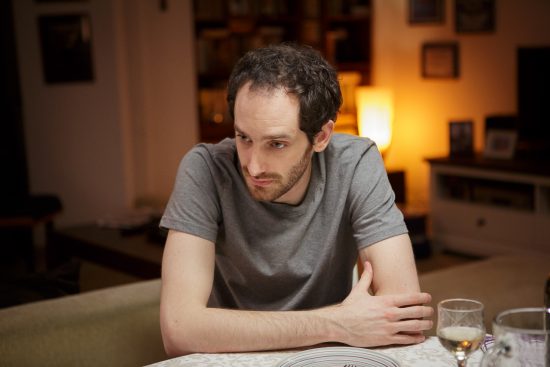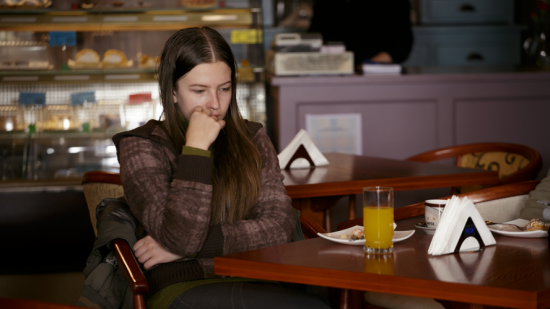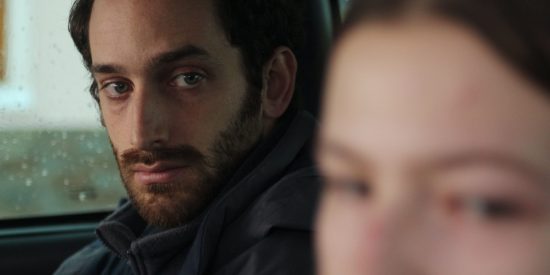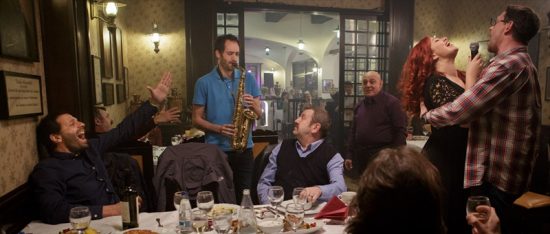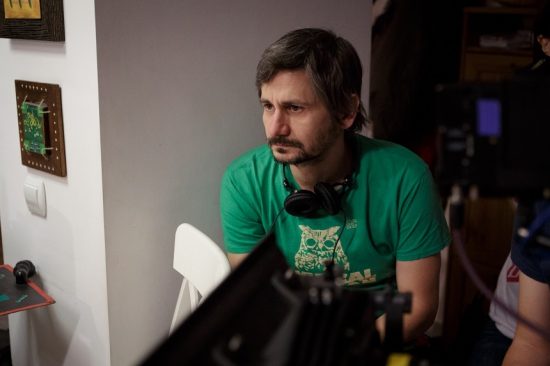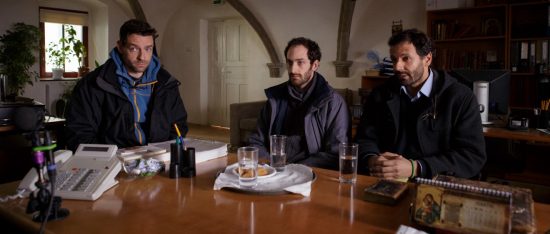Ethical Choices: The Making of The Fixer
Trevor Hogg chats with filmmaker Adrian Sitaru and actor Tudor Istodor about blurring ethical lines and producing The Fixer…
A reoccurring theme for Romanian filmmaker Adrian Sitaru (Domestic) is abuse inflicted either purposely or unintentionally by people; the subject matter is addressed in The Fixer (2016) where the title character portrayed Tudor Istodor (A Month in Thailand) seeks to motivate a young swimming protégé and orchestrate an interview with a repatriated underaged prostitute for a French news agency. “It’s about how we are abusing in the name of journalism and with the best intentions. Sometimes you are not even aware that you’re committing an abuse.” The story is based on a real-life incident. “My director of photography, Adrian Silisteanu [Somewhere in Palilula], before becoming a filmmaker worked as a fixer and best boy for Agence France-Presse in Bucharest. It happened to him. There are misconceptions of about what makes a prostitute even if you’re talking about a minor. He met this girl who was like a daughter of some friends of him and she talked so innocently about what she did. Adrian was affected by the experience. He went back to Bucharest and left the girl in more danger than before.”
Adrian Silisteanu co-wrote the screenplay with Claudia Silisteanu with his real-life experience augmented with insights from prosecutors and law enforcement agencies. “The first draft of the script was only the story of the journalist and his relationship with the girl,” reveals Sitaru. “However, Adrian felt it was important to have the idea of the boy even if he’s not his natural son.” Istodor sought out advice so to make the interaction between adult and child believable. “I have a friend who was in the same situation. He was with a girl who had a nine-year-old son. Some things you can try to do better but there’s always this thing in your head going, ‘He’s not my son.’ You’re trying to do your best.” For a long time, the two storylines were treated as if they were one. “An interesting question is what does Radu [Tudor Istodor] do after the film is finished?” notes Sitaru. “Does he continue to want to be a good journalist or give up. We did the plot between Radu and Matei [Christian Ilinica] because Adrian Silisteanu learned from this journalistic experience about how to behave with his own children. You have to think twice all of the time.”
Radu is not a likeable character. Maybe it’s a good thing that in the beginning that you don’t know if you like him,” notes Istodor. “At the end, you understand that Radu realizes something so he changes.” Editing also affected the perception of the protagonist. “We had a scene that was cut out with Radu, Carmine [Andreea Vasile], and Matei in the car. Radu has a fight with Matei. It was over the top.” Casting for the role of the young prostitute Anca portrayed by Diana Spatarescu was difficult. “We tried various things,” explains Sitaru. “Maybe have an 18-year-old actress play the ages of 14 or 15 but it didn’t work as the body language is different. Finally, we decided to have a 14 or 15-year-old. It’s between a girl and a woman. It’s not about how talented was the girl. It’s easy to say to the parents that we’re doing a masterpiece for Cannes or Toronto. We tried to take care. We talked to the parents to make sure that their daughter knows what it means to have oral sex.”
When Radu gets to be alone with Anca in the car to make the final arrangements for the interview he is horrified when she offers to have oral sex with him. “It was difficult because it never happened to Adrian,” remarks Sitaru. “It was fiction. We read a book by a psychologist who dealt with abused children. It starts with a story about a nine-year-old girl who went for therapy and the first thing she did was was to offer to do a blowjob. He explained well why she did that. It’s the only way that they know how to communicate with a man so she wants to be nice.” Two days was spent shooting the pivotal scene. “It was trail and error. The turning point was when I asked Tudor to slap her.” Istodor was not incline to hit his young co-star. “I was afraid to hurt her.” A compromise was attempted. “He was pretending to slap her,” recalls Sitaru. “Then it accidentally happened for real. Tudor had a good reaction.”
Extensive rehearsals were conducted. “There were a couple of months of pre-production and then we rehearsed, met and talked,” states Istodor. “We tried stuff and improvised; that all created the character. I didn’t have to get on the set and say, ‘What’s my character about?’ It was there.” The story was allowed to evolve beyond the written page. “There were many things that we discovered during the rehearsals that we kept for the shooting because they were very good and natural,” notes Sitaru. “We had one ALEXA camera. We had two for the scene in the restaurant when Radu is playing the saxophone. Everything needed to be covered in one day. Also, in the café with the girl, we had two cameras. We used the cameras from the same angle. One was wide and the other had a zoom to cover as much as possible from that direction without doing too many takes.” Istodor enjoyed getting the opportunity to play a musical instrument. “It was fun. I loved the energy that was there. The actors were great and of course, the saxophone part.” The restaurant scene did not have a definite beginning dictated by Sitaru who enjoyed the spontaneous interaction between the cast which led to some funny and natural moments. “I told them to start with some discussions.”
“I’m obsessed with sound,” admits Sitaru. “I love to stay with the sound designer [Ioan Filip] and work together on each detail to create the right atmosphere. It’s a realistic film so we tried to be as realistic as possible. A big issue was the sound design when they’re leaving the car with the girl. We weren’t sure if we needed to hear the sound of the city. We played with the timing.” A happy musical accident took place while shooting. “When the French crew arrive in the car I wanted some music to put at the end of the scene. I asked Mehdi Nebbou, who plays the French journalist, to put on some music and we’ll change it in the editing. He said, ‘I just finished an Indian film and have some Hindi pop music that I like.’ I said, ‘Why not?’ Mehdi put it on and the music was so nice, funny and unexpected for me. It was so good for the film. We did another with an Indian musician on the Internet who communicated something similar for the rights but kept this idea of Hindi pop music.”
Budget was a major concern for the Romanian and French co-production. We had most of the money from Romania and not so much money from France,” states Sitaru. “We applied for a Romanian grant which was €60,000 for a short film. It’s not a cheap film. There was a moment where we were going to give up if we didn’t have enough money and had to do it with big compromises but finally it was okay.” The last scene is a proud moment for the filmmaker with Radu chasing after Matei at swimming meet and uttering some unheard words to him. “It was demanding for us to find out that Radu has learned something. It’s not about what you are telling with your voice but your manner of telling it. It was a metaphor but also realistic. It was funny when Adrian shot the scene he said, ‘It would not work without words. Let’s say something.’ While editing we cut off of the sound and he said, ‘It’s working!’”
Many thanks to Adrian Sitaru and Tudor Istodor for taking the time to be interviewed and for more information visit the official website for The Fixer.
Trevor Hogg is a freelance video editor and writer who currently resides in Canada; he can be found at LinkedIn.
Next PostPrevious Post(adsbygoogle = window.adsbygoogle || []).push({});

